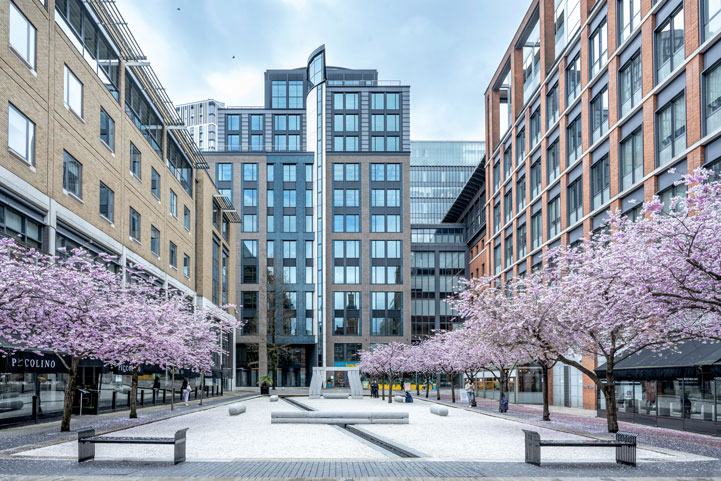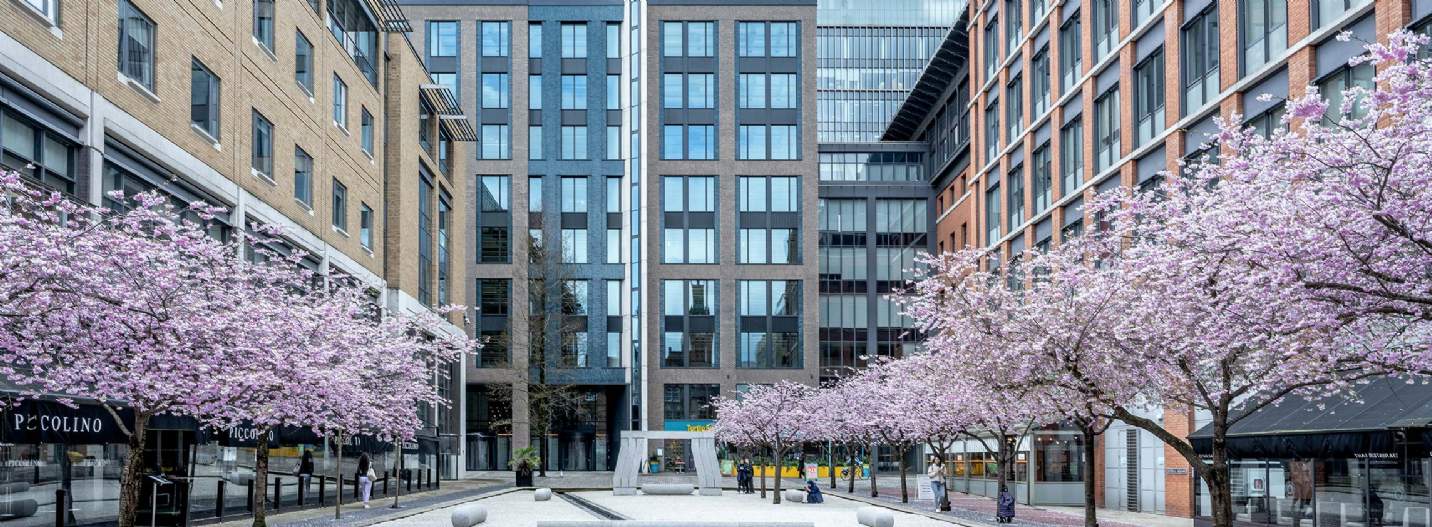‘Serviced offices’ has taken more space than any other sector in Birmingham over the last five years
The rise of 'flex' in Birmingham city centre
The serviced office sector has experienced remarkable growth in recent years, transforming the traditional office landscape in UK cities. As the evolution of the office gathers pace, so too does the desire to make workspaces a destination that combines work and well-being, to create a more autonomous and flexible offering, with an increased desire for workplaces that incorporate flexibility, collaboration and amenity to attract and retain talent. This flexibility aligns with the evolving work preferences of modern professionals and has fuelled the demand for serviced offices in UK cities.
Office buildings can do more than just provide a space to work. One way to promote an improved atmosphere within your building is by creating an element of flexible office, enabling businesses to co-locate with other similar businesses and potential talent pools. As a result, multi-let office buildings are increasingly providing a mix of serviced office and traditional space. Birmingham is a great case in point, with 75% of the multi-let new developments from the past five years offering a percentage of flex space within their building.
For landlords, the sweet spot lies in being able to attract and accommodate serviced office-style occupiers, often with a younger, vibrant workforce, while not alienating more traditional tenants
Clare Bailey, Director, Commercial Research
Initially popular with start-up companies, these types of spaces are increasingly being used by large multinational organisations that need to expand or reduce their workforce in line with the volume of work they have. It’s easy to respond to a period of unexpected growth by increasing the amount of office space included in the rental and upping the headcount at short notice. By the same token, overheads can be reduced by scaling down on demised space with the ability to utilise shared spaces on a more flexible basis and driving overall efficiency. In fact, the importance of flexible office space in a multi-let building was highlighted in Workthere’s most recent Landlord Flexible Office Survey, with 61% of landlords being comfortable letting 10–25% of a hypothetical 50,000 sq ft building to a flexible office operator. For landlords, the sweet spot lies in being able to attract and accommodate serviced office-style occupiers, often with a younger, vibrant workforce, while not alienating more traditional tenants.
Serviced offices provide the flexibility to scale up or down easily, accommodating the evolving needs of businesses. In new office buildings, serviced offices are designed to be adaptable, enabling businesses to adjust their space requirements without disruption. CEG’s Alpha in Birmingham was one of the first office buildings to offer a contemporary co-working environment with the perfect place for occupiers to grow their businesses. New office buildings in Birmingham are recognising this demand, and, as a result, many of the city‘s best-in-class buildings, including 103 Colmore Row, 10 Brindleyplace and Two Chamberlain Square, now offer an element of serviced offices within their building. In fact, ‘serviced office operators’ has accounted for the largest proportion of take-up in Birmingham over the last five years, with the sector accounting for 19% of the total take-up of office space, the highest of the Big 6 office markets.
Spacemade is the most recent operator to launch new flex space, partnering with CBRE Investment Management at their landmark 10 Brindleyplace development. Dan Silverman, co-founder of Spacemade, said, "We’re very excited to have launched 10X at 10 Brindleyplace. 10X integrates the highest quality flexible workspace and amenities into this prime Grade A asset. The demand for thoughtfully designed, hospitality-led flex space is incredibly strong in Birmingham and has become a crucial amenity for corporate occupiers of the traditional leased floors".
Spacemade is operating the space on a management agreement basis rather than a conventional lease, a growing trend that is being seen across the UK flex market. Ben Thacker, Director of National Office Agency at Savills in Birmingham, said, "There has been a notable rise in the popularity of serviced operators taking space under the joint venture of a management agreement as opposed to the traditional serviced office operator simply becoming a building tenant with their own autonomy. Building owners have a desire to be actively involved in the flex sector to diversify their offering and recognise the supporting benefits of flex facilities to the wider asset management and leasing strategies across the rest of the building. A successful flex operation can also often return a higher net overall rent to the landlord than a conventional letting."

What will be the key drivers of Prime demand moving forward?
Savills recently introduced a new Prime category into the occupational data. This was necessary due to the historic definition of Grade A becoming increasingly broad and the need to separate best-in-class product in terms of amenity and sustainability from the standard refurbished Grade A offerings. There is just 550,000 sq ft of Prime availability in the Birmingham market. With the addition of flex operators into most of these buildings making spaces even more attractive to occupiers and just 1.1 years of Prime supply based on average demand, we are likely to see a fight for quality over the limited space that remains available in the market.
Which sectors are going to be active in the Prime market?
A look back at the data shows that ‘Professional’ has historically been the most active in acquiring Prime space. Between 2019 and 2023, the sector has accounted for 30% of Prime take-up. ‘Serviced Office’ has been the second most active with 25% of demand.
Much of this demand has been driven by ‘Professional’ occupiers upgrading their office space as a response to the pandemic, with 60% of this activity coming from 2020 onwards. With the emergence of hybrid working, many ‘Professional‘ occupiers have been looking for incentives to encourage their staff back into the office through the offer of the best quality space to aid personal and professional development. This has also involved companies downsizing on their previous space to take a ‘smaller but better’ approach to adapt to the hybrid model. However, whilst spaces may be smaller, rents are going up. Of the ‘Professional‘ occupiers at 103 Colmore Row, the occupiers are paying, on average, 50% more than previously per sq ft to occupy the building, with 43% of these occupiers increasing their total rent roll despite reducing their office size.
Savills expects the sector to continue to drive Prime demand in 2023 and beyond. More companies are expected to follow the example set by occupiers such as Grant Thornton and RSM who have already made their move.
Looking away from ‘Professional’, it is likely that we will see growth in Prime demand from the tech sector. Birmingham is establishing itself as one of the most exciting hubs for growing companies outside of London, as it was recently named the fourth-best city in the UK for scale-ups based on the number of active high-growth companies in the market. Furthermore, with 6% employment growth in the sector expected over the next five years, we are likely to see a growth in Prime demand from these companies looking for a higher quality office space as they reach later stage funding and increase the scale of their operations. We have already seen this in the market with gaming company Facepunch moving from Walsall to 103 Colmore Row in the city centre, and this may set a precedent for other tech companies to follow at other Prime buildings within the market.
By the end of 2027, prime rents are expected to reach at least £47 per sq ft, which would represent growth of 14.6% annualised at 2.9% per annum
Clare Bailey, Director, Commercial Research
The strong provision of flex space across these spaces is also likely to aid Prime demand moving forward. By offering this additional amenity to potential occupiers, it makes these spaces stand out even further from traditional Grade A buildings. This is certainly applicable to 10 Brindleyplace where the inclusion of Spacemade in the building will attract occupiers from many business sectors who are looking to be part of the innovative Brindleyplace development but are also seeking some flexible amenity on top of their own leased area of the building.
A positive story for rents?
The outlook also looks positive for landlords, investors and developers in the Prime market. Birmingham currently has the second highest Prime rent in the UK Big 6 at £41 per sq ft, achieving 20% rental growth over the last five years. Savills latest forecasts predict that this growth trend is set to continue. By the end of 2027, prime rents are expected to reach at least £47 per sq ft, which would represent growth of 14.6% annualised at 2.9% per annum.
The same can be said when rents are looked at on a Prime average basis – between 2019 and 2022, the average Prime rent in Birmingham grew by 15% to £37 per sq ft. This demonstrates that the rental growth is not just at a single building; we are seeing growth in buildings across the Prime spectrum which could provide a lucrative opportunity for potential investment into this sector of the Birmingham office market.
